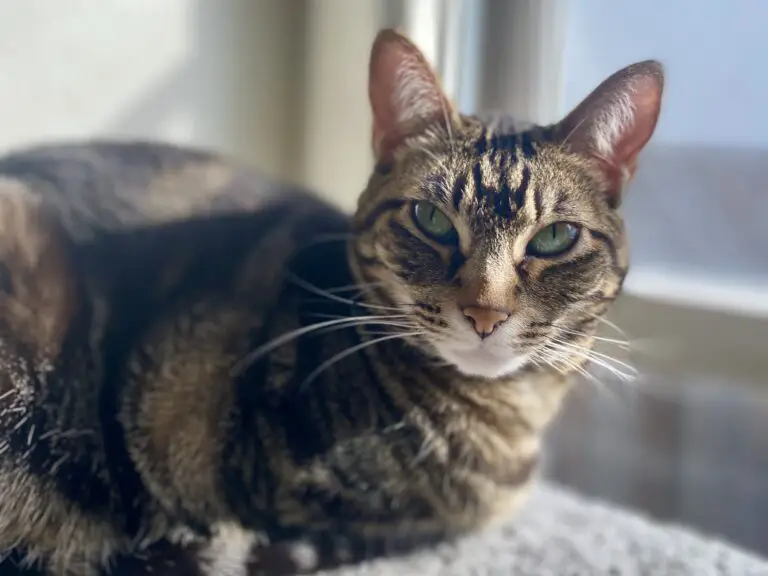How to Choose the Right Vet for Your Cat
Choosing a veterinarian is an important part of what to do before you get a cat. And some cat owners find themselves wanting to switch to a new one for one reason or another.
Vet practices can have long wait times for new clients, so planning ahead will ensure you’re able to weigh your options and choose the clinic that works best for you and your feline fuzzbutt.
This article walks you through everything you need to consider in the process of choosing a vet for your cat.

Table of Contents
Ask Other Pet Owners
One of the best ways to find a vet is to ask friends, family, coworkers, and neighbors what vet they go to.
Here’s What to Ask:
- Why did they choose that particular vet?
- How long have they been going to that vet?
- What do they like about the vet and why?
- What do they not like about the vet and why?
- What do they like and not like about the clinic?
- What do they think about how the clinic communicates with them?
- What do they think about how people at the clinic interact with their cat?
- What do they think about their prices? Have they compared prices to other clinics?
- Would they recommend the vet to others, and why or why not?
You might also look at local online forums or networks, such as Nextdoor. You can do a search to see if there are vets that are particularly well-liked. You can also search for specific vets or clinics once you have a short list, in order to see if people have mentioned them in any threads or posts.
An internet search will also help you find veterinary practices near you.
Find Something Close if You Can
Make sure you narrow your search to practices that are close to your home if possible. Ideally, you’re looking for clinics that are within a 5-10 minute trip of where you live.
This will prevent having to make a long drive if urgent care is ever needed. And being close will also minimize the stress of each trip to the vet for your cat, as most cats are stressed by travel (and the vet visits themselves).
In some communities and rural areas, something close by may not be realistic.
What are the most important things to consider when choosing a vet?
There are three main things you want to consider when selecting a veterinarian for your cat:
- Competent care for your cat
- Communication with clients
- Convenience in location and hours of service
Interview Vets Before Choosing
In addition to getting recommendations from pet owners you know, it’s also a good idea to interview the vets that make your short list.
Doing this will help you have a better sense of whether their approach, experience, and communication style are a good fit for you.
Here’s What to Ask:
- What proportion of the clinic’s clients are cats? Most clinics see a large number of cats. But if only a tiny proportion of the practice is cats, then you may want to look for a vet that treats cats more frequently.
- What are the clinic’s areas of specialization? How do they handle referrals for issues or procedures that can’t be handled in-house?
- What certifications and licenses are held by the clinic’s team? Accreditation with the AAHA is not required of practices, but is a good indicator of best practices in a clinic. You can also search for cat-friendly certified clinics.
- What are their hours of service? You want to make sure that the clinic has hours that are compatible with your work schedule. Some offer evening and weekend hours.
- How many practitioners are part of the practice? If there’s more than one vet, will you always work with the same vet, or will it vary according to availability? Can you request your preferred vet? A bigger practice will probably mean more scheduling flexibility, but could mean you don’t get to see the same clinician every time.
- Can you reach someone outside of clinic hours in the event of an emergency? Some practices offer in-house emergency services, while others provide outsourced services within their network. It is helpful to know ahead of time what you can expect.
- What are their prices? How do they compare to other vets in the area?
- Can you communicate directly with the vet outside of actual appointments? Some vets are only available to leave messages for, rather than being available directly by phone or email.
What are the requirements to practice as a vet?
Most places have specific education and licensing requirements in order to be a vet. For example, in order to practice in the United States, all vets must earn a Doctor of Veterinary Medicine degree and pass a licensing exam. This means four years of graduate study and training beyond completion of a bachelor’s degree.
When should I start looking for a vet?
Many new cat owners find themselves scrambling on this front because they’ve already brought a cat home, only to discover that many clinics have long wait times for new clients and non-emergency visits. It is not uncommon for wait times to be several weeks.
The right time to find a vet is before you get your cat. It’s not the end of the world if you haven’t found a vet ahead of time, but you’ll probably have fewer options if your cat needs to be seen quickly. When you do the search ahead of time, you’ll have time to do your research and feel confident about which one you end up choosing.
And if you feel like the clinic you’ve chosen isn’t a great fit for whatever reason, it’s okay to come back to find another one. It’s all about whatever works best for you and your furry pal.
